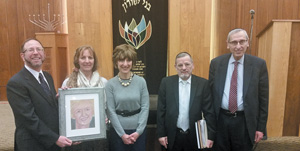
Teaneck–On a bitterly cold night last week, hundreds of people came to remember and pay tribute to Esther Manischewitz, z’l, on her first yahrzeit, at Congregation Bnai Yeshurun (CBY). Mrs. Manischewitz was a pillar and founding matriarch of the Teaneck Orthodox community, as well as a founder of CBY, and she was memorialized with the first in a series of lectures named in her honor and funded by The Esther Manischewitz Community Education Fund.
“I met her only once, but she left an indelible impression on me, unlike anyone I have ever met before or who I am likely to ever meet. What a remarkable woman,” said Prof. David Berger, Dean of Bernard Revel Graduate School of Jewish Studies (BRGS) at Yeshiva University (YU), who served as a master of ceremonies. They presented a video of Mrs. Manischewitz, who was terminally ill, in her last public appearance in Oct. 2013. She came to tell students at BRGS about her relationship with Nechama Leibowitz, z’l, the outstanding scholar and pioneer in teaching women Torah. Leibowitz was her teacher and also her neighbor, and they shared a courtyard with Rav Kook.
As you watched Mrs. Manischewitz on the screen, you see her revitalized as she painted an extraordinary picture of early 20th century Torah giants and of Jerusalem in the 1930’s, while her lifelong passion for Eretz Yisrael, Torah and Klal made it feel as if she was actually in the room.
“It was like her last hurrah. She was captivating. Her recall, her energy–it was incredible. Even though she was meeting with so many doctors she came alive that night. The event took place just three weeks before she died, and yet you would never know. It was the culmination of her life’s work,” said Mordechai Cohen, Associate Dean at BRGS.
Before keynote speaker Rabbi Dr. Schnayer Leiman delivered a talk about his adventures as a detective searching for two extraordinary heroines of spiritual resistance of the Holocaust, Sharon Kaplan, one of Mrs. Manischewitz’s three daughters came forward to describe the fund the family created in her mother’s memory. “The Esther Manischewitz Community Education Fund is an excellent way to honor my mother, and we are so grateful to Bernard Revel Graduate School for recognizing her in this way,” she said.
Then Prof. Leiman led his audience through a paper chase to discover the fate of the Orthodox women who organized Jewish women’s learning groups in Vilna during the war–in the small haven of time and space between the Hitler Stalin Pact, and Germany’s attacks on the Soviets. Presenting a facsimile of a 1940’s document in Lithuanian and Hebrew, Prof. Leiman found through an antique dealer, he said, “He showed me ten items and I rejected nine. But this one I bought because it very well may be the only surviving record of the only functioning Yeshiva in Vilna in 1940…Yeshivat Maharsha, a yeshiva that was destroyed in the Holocaust.”
By creating the setting in World War II, describing the beginning of the war and recounting the rising fear and the uncertainty, Prof. Leiman offered attendees the broader political and moral conditions on the ground, describing tragic last acts and decisions facing rabbinic leadership, including a seemingly random essay written by survivor and noted author Joseph Foxman in 1957 (father of Abraham Foxman of ADL). The process to authenticate the document and attempts to uncover more on the yeshiva’s rabbis listed in the document led to the discovery of the story of Feigel der Rav, Feigel, the Rabbi’s daughter.
From September 1941, she was in the Vilna Ghetto and immediately began organizing religious girls and women. They davened, recited Tehillim, studied Torah, Pirkei Avot and Mussar, all in Yiddish. The ad-hoc school for women became known as The Women’s House of Study. In Yiddish, Prof. Leiman said, “It was Der Vieberisher Beis Medrash.” It also became an important yeshiva for men and boys in Vilna, Yeshivat Maharsha. The lectures continued into 1943, when everyone was rounded up and deported to Stutthof, a notorious camp, where only two women survived. Their names suggest they were the wife and daughter of one of the rabbis listed on the 1940 Vilna yeshiva document. Prof. Leiman did not rest until he found out the fate of the two women, who moved to Israel after the war, and continued to pursue lives of Torah and mitzvos as unsung heroines of the Holocaust. And he concluded, Esther Mansichewitz was cast in the same mold as they were, and it was a fitting way to begin the series in her honor.
In February, the series will continue with a visiting professor from Bar Ilan University who will speak about the Vilna Gaon’s opinion on secular studies. On March 30, Professor Jeffrey Gurock will discuss his new book about rewriting history: 1938-1967: The Holocaust, The Rise of Israel and The Six Day War.
To see the Manischewitz/Leibowitz lecture video go to http://www.yu.edu/revel/ and for Donations in her honor visit www.yu.edu/esther










